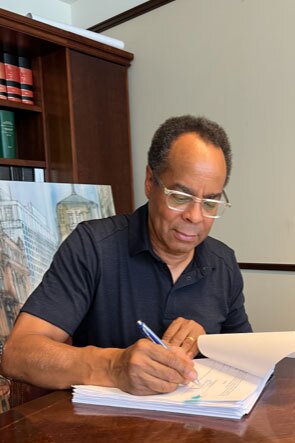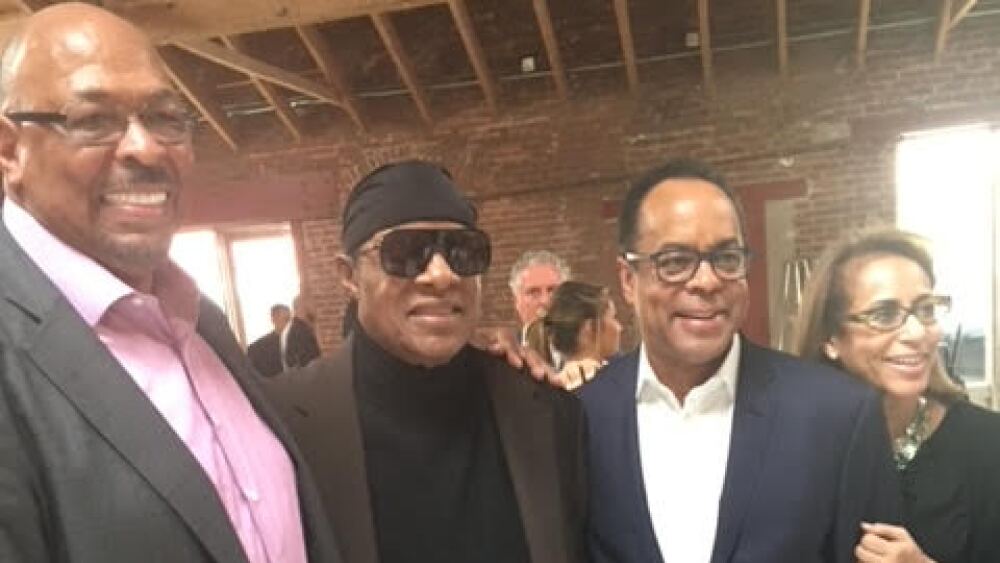Developer Quintin Primo, who has done more than $14 billion worth of transactions over his decades-long career, is currently eyeing revitalizing Chicago’s Loop in his hometown, among other projects. Wherever his firm, Capri Investment Group, finds itself, one thing is for certain: Primo is serious about executing, seemingly, insurmountable tasks with compassion.
“Most recently is focus on rejuvenating Chicago’s downtown CBD core, with the combination of the redevelopment of the Thompson Center into the regional Google headquarters, the renovation of 115 S. LaSalle Street for state of Illinois offices, and the adaptive reuse of 111 West Monroe into affordable housing is consistent with his historic desire to solve problems,” says Randall Rowe, chairman and founder of Chicago-based Green Courte Partners who has known Primo for more than 40 years. “His energy, enthusiasm and optimism are unlimited and contagious.”
Prime/Capri Interests, LLC, which is 50-50 joint venture between The Prime Group and Capri Investment Group, acquired the 1.3 million-square-foot Thompson Center in July 2022, according to Primo. Prime/Capri Interests, which acquired the Thompson Center for $105 million, then concurrently entered into a build-to-suit agreement with Google, allowing the company to acquire the redeveloped project when it is completed, according to Primo.
As part of the deal, Prime/Capri Interests, LLC, also acquired the 1.2 million-square-foot BMO Harris Bank building, located three blocks south along LaSalle Street, “for the purpose of, first, selling one-half of the building to the state, which was relocating from the Thompson Center, due to Google’s desire to own and control 100 percent of the project; and, second, redeveloping the 600,000-square-foot balance of the office building into hotel and residential uses,” says Primo. BMO was in the process of vacating the building.
Primo explains that the much-lauded project was complex, and because of market conditions at the time, only came together through clever work, exemplifying his ability to strike the right balance while working with a variety of different players.
He credits the deal’s success to a diverse group of people collaborating behind the scenes.
“The Thompson Center/Google transaction is a testament to people of color working together,” Primo says. “That transaction would not have happened were it not for the Real Estate Executive Council, which got Michael Tabb [Director, Real Estate Services, Americas at Google] and myself, that organization got the two of us together. If that had not happened, this transformative project that is represented by the build-to-suit for Google of the James R. Thompson Center, would never have happened without two people of color joining forces and marshaling that project through an extensive vetting and internal approval process.”
Primo says he and his team were given the opportunity “to show what we got, and that’s all we needed, was the opportunity to play ball, and we did.”
From “failure to failure”
He brings that same attitude to his multi-billion dollar real estate empire making him a standout in an industry that often seems stacked against people of color. As co-founder, chairman, and CEO of Chicago-based Capri Capital Partners, Primo presides over one of the largest minority-owned real estate investment and management firms nationwide. He realizes his level of success is rare, but he believes other people of color can do it, too.
Primo also emphasizes the importance of perseverance.
“My favorite quote of Winston Churchill is: ‘Success is moving from failure to failure without the loss of enthusiasm,’ so it is for those [people] of color thinking of getting into the real estate business,” Primo says. “One should be prepared to fail, more than once, but through that failure, much will be learned.”
Primo strongly encourages people—especially young African Americans—to immerse themselves in the industry. A great place to start, he says, is the Real Estate Executive Council, or REEC, in Chicago, which he helped found, and the Urban Land Institute, an “extraordinary organization” that has benefited him directly. He says, thanks to ULI, anyone in commercial real estate is accessible with just a telephone call or two—a vital resource for serious industry players.
“It’s a business that few Black and brown people are really involved in,” Primo says. “We are systemically excluded from the business. I think that, increasingly, there are programs, like the programs at ULI, like Real Estate Roundtable, like the Real Estate Executive Council. There are programs that are encouraging in guiding young people to enter the industry from all different directions, and those programs are to be applauded, but we only make up 1 or 2 percent of the overall composition of the industry.”
As the son and grandson of Episcopal ministers, Primo’s involvement with REEC is a prime example of his penchant for giving back. He and partner Victor MacFarlane, the founder and executive chairman of San Francisco-based investment management firm MacFarlane Partners, founded the organization to help give other executives of color a leg up in the industry. Primo served as REEC’s first chairman.
“Quintin is one of the trailblazers for Black people in commercial real estate,” says Ken McIntyre, CEO at REEC. “I’ve been an admirer of all that he’s done.”
Thinking “bigger”
Primo formed a partnership early on with his longtime friend, Daryl Carter, founder, chairman, and CEO of Irvine, California-based Avanath Capital Management, one of the nation’s largest owner-operators of affordable apartment communities. Carter, who currently serves on ULI’s Global Board of Directors, first met Primo when both were students at Detroit’s Cass Technical High School. They formed a close friendship years later in Cambridge, where Carter was in graduate school at the Massachusetts Institute of Technology and Primo was attending nearby Harvard Business School, achieving the rare feat of being accepted immediately after graduating from Indiana University Bloomington.
After finishing their degrees, both ended up in Chicago, where Primo worked as a lender at Citicorp Real Estate. Through Carter, Primo met his wife of more than 30 years, Diane. Years later, Carter and Primo created their company, Capri Investment Group. It was Primo’s second endeavor after his first business failed. Working with Carter, who had relocated to Southern California, seemed a natural fit.
“We both knew a fair amount about commercial real estate. We had worked together and were friends and had a healthy degree of respect for each other,” recalls Primo. “He was based in L.A. I was based in Chicago, and I thought that given that our business was going to be advising public pension funds, two of the largest public pension funds were in California, CalPERS and CalSTRS.
“We both knew a fair amount about commercial real estate. We had worked together and were friends and had a healthy degree of respect for each other,” recalls Primo. “He was based in L.A. I was based in Chicago, and I thought that given that our business was going to be advising public pension funds, two of the largest public pension funds were in California, CalPERS and CalSTRS. I thought that the geographic diversity would err to our benefit, and I wanted to have someone I could commiserate with and grow a business. Daryl was a perfect partner in that regard.”
Their company went from $1 billion in assets under management to $5 billion “just like that,” according to Carter. He credits Primo with always thinking “bigger” and being an “innovator beyond most people” he knows.
“Quintin is probably the best strategic thinker that I’ve ever met,” Carter says. “I mean he has the ability to visualize and create strategies well beyond my capability. I was the kind that was the nuts and bolts like, ‘Forget the dream. What do we do tomorrow?’ I like to say Quintin was the most positive, upbeat, and the consummate optimist.”
A servant’s heart
The two were partners for nearly 15 years until Primo bought Carter out in 2006. MacFarlane was one of their early mentors.
“I have known Quintin for several decades, having first met him and Daryl Carter around the time they were starting their firm,” MacFarlane says. “Quintin is intelligent and charismatic—and, lesser known, a talented musician. In all of his endeavors and relationships, it’s very clear that he cares about things beyond himself.”
Primo credits his Episcopal upbringing for his approach to business, which he describes as having more of a servant’s heart rather than a self-serving one. When Primo’s father, a church bishop, wanted to start a center to serve Chicago’s homeless population, he enlisted his son’s expertise in commercial real estate to get it done. Known today as the Primo Center, it is now considered one of the biggest providers of housing and health services in the city.
Primo is also eyeing Washington, D.C., where he has a $300 million, around 500,000-square-foot development planned for 14th and U streets. It will be the new headquarters of the NAACP. The project is also slated to include: a comedy club, backed by Dave Chappelle; a restaurant with a Southern flair from Food Network chef Carla Hall; the Washington Jazz Arts Institute; and the first Alvin Ailey American Dance Theater and School outside of New York.
Primo is focusing on serving the entire community akin to what he did after acquiring the Baldwin Hills Crenshaw Plaza in an historically underserved community in Los Angeles. He says ensuring it blended well with the surrounding neighborhood, in its design and day-to-day operations, made it successful.
When the pandemic hit, Primo quickly pivoted. With the needs of the community in mind, he worked closely with tenants and deferred rent. The focus was to treat them with compassion as he was raised to do.
Communities first
“As an owner and developer who is investing in the community, it is critically important that you always listen to the community first before planning your development,” Primo explains. “We were very sensitive to the needs and the wants and the goals of the community at large. This was really a hallmark of how we did business and really established—probably more than in any other project—Baldwin Hills established our track record for listening and being sensitive to the needs of communities.”
He points out during the protests in 2020, Baldwin Hills Crenshaw Plaza remained unscathed, with no graffiti defacing the property despite it being in areas with gang activity. He credits that to neighbors understanding his company truly cares about them and their needs. It is a lesson he hopes more developers will take to heart.
“I was told more than once that we were the only owners that ever actually did what they promised to do,” Primo says. “That seems so simple, but for us, it was always about transparency, honesty, very basic values in the responsible and ethical management of the mall. Just very basic things that I find many of my competitors completely miss because they are so completely focused on one thing, and that is money.”
It was through Capri Capital’s acquisition of Baldwin Hills Crenshaw Plaza that Primo met Debbie Allen after leasing space to her dance studio at its former location in South Los Angeles. Allen, a Golden Globe and Emmy Award winner, asked Primo to perform last year at the star-studded opening of the Debbie Allen Dance Academy housed in the new Rhimes Performing Arts Center, named for “Grey’s Anatomy” creator, Shonda Rhimes, who gifted the building to Allen.
“I agreed to play a few jazz classics on the piano with a professional quartet,” said Primo of that night on stage. “My opening composition was the Herbie Hancock standard, ‘Maiden Voyage.’ I had been extremely worried that Herbie Hancock, who had been invited, might show up and was relieved when he didn’t. But just as I began to perform the piece, Stevie Wonder and his wife, Tomeeka, walked in! I was shaking so badly I could hardly push the keys down. I eventually got over it, and Stevie, at least politely, seemed to enjoy the performance, even with all my mistakes.”
Carter was also there to witness the occasion. He says Primo, normally, “has absolute confidence to do anything,” so he was surprised his friend was intimidated.
“Quintin’s musical talents certainly align with his business talents,” Carter adds. “Like improvising jazz, Quintin is one of the industry’s most creative real estate dealmakers and strategists. He is comfortable with uncertainty and able to bundle disparate concepts into a positive outcome.”









